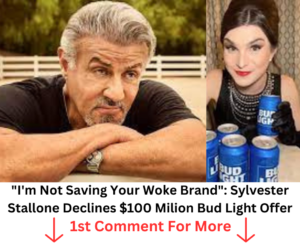
Sylvester Stallone’s Bold Stand: Rejects $100 Million Bud Light Endorsement Offer
In a surprising twist within the realm of celebrity endorsements, iconic actor Sylvester Stallone has made a striking statement by turning down a jaw-dropping $100 million endorsement offer from Bud Light. This decision comes amid growing controversy surrounding the beer industry’s attempts to align with progressive values, signaling a shift in the dynamics between celebrities and brands, as well as shedding light on the complexities of “wokeness” in marketing. Let’s delve into the reasons behind Stallone’s refusal and its implications for both Bud Light and the broader advertising landscape.
Sylvester Stallone, famed for his roles in the Rocky and Rambo franchises, has a long history of endorsing products and services. With his rugged on-screen persona and global stardom, Stallone’s name carries considerable weight in the world of marketing. Bud Light’s whopping $100 million offer to Stallone was not only a testament to his star power but also a reflection of the brewing giant’s desire to appeal to a diverse consumer base.
The controversy surrounding the beer industry’s marketing strategies has been brewing for some time. Many companies have shifted their focus to align with progressive values, emphasizing inclusivity, diversity, and social responsibility in their advertising campaigns. However, this approach has sparked backlash from those who perceive it as virtue signaling or straying too far from the brand’s core identity.
Stallone’s rejection of Bud Light’s offer came with a bold statement: “I’m not saving your woke brand.” This succinct yet powerful remark encapsulates the crux of the matter. Stallone’s refusal indicates that not all celebrities are willing to endorse brands perceived as overly politicized or “woke.”
In an era marked by heightened social and political polarization, the concept of “wokeness” has become a contentious issue in marketing. While some argue that brands should use their platforms to address societal issues, others believe that companies should focus on their core products and steer clear of divisive debates.
Stallone’s decision to decline the Bud Light endorsement offer represents more than just a financial choice; it reflects a stand against the perceived over-politicization of brands. By rejecting Bud Light’s offer, Stallone sends a clear message that he is not interested in associating himself with a brand that prioritizes a particular social or political agenda over its core identity.
This decision also highlights the growing influence of celebrities in shaping public discourse. As public figures with significant followings, celebrities have the power to influence consumer behavior and public opinion. Stallone’s refusal to endorse Bud Light serves as a reminder that celebrities are not willing to lend their name to causes or campaigns they do not fully support.
Bud Light’s $100 million offer to Sylvester Stallone was undoubtedly a strategic move to bolster its image and reach a broader audience. However, Stallone’s rejection has the potential to impact the brand’s reputation. While some consumers may applaud Bud Light’s efforts to align with progressive values, others may view the rejection as a sign that the brand has strayed too far from its traditional image.
This rejection also raises questions about the effectiveness of celebrity endorsements in today’s marketing landscape. With consumers increasingly valuing authenticity and transparency, celebrities who decline endorsement deals based on personal values may resonate more with certain segments of the population.
Sylvester Stallone’s refusal of Bud Light’s $100 million endorsement offer and his statement, “I’m not saving your woke brand,” signify a pivotal moment in the world of celebrity endorsements and marketing. It underscores the importance of authenticity and alignment between a celebrity endorser and a brand’s core values and messaging.
As the advertising landscape continues to evolve, brands will need to strike a balance between staying true to their core identity and adapting to changing societal norms. Celebrity endorsements will remain a potent tool, but only when the alignment between brand and endorser is perceived as authentic and genuine by consumers. Stallone’s stand serves as a reminder that in today’s marketing landscape, authenticity and values matter more than ever.